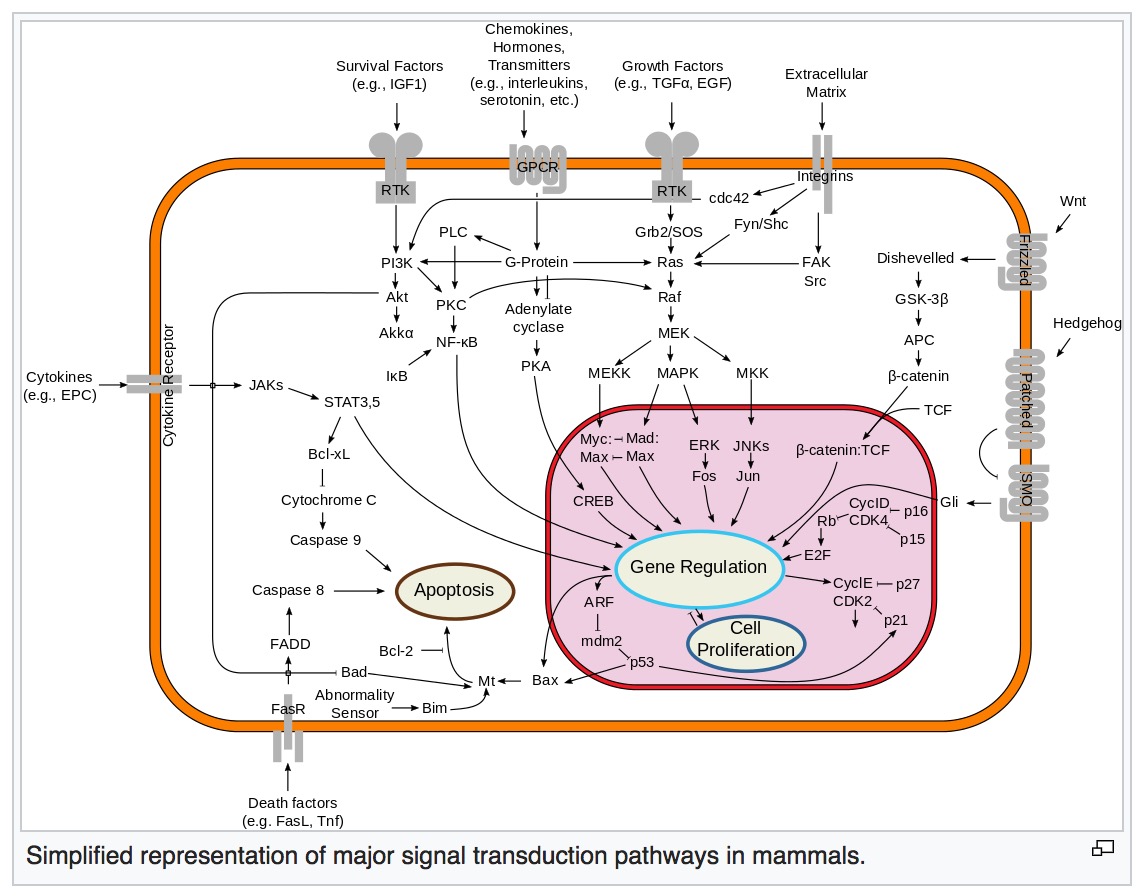Bcl2
Bcl-2 (B-cell lymphoma 2), encoded in humans by the BCL2 gene, is the founding member of the Bcl-2 family of regulator proteins that regulate cell death (apoptosis), by either inducing (pro-apoptotic) it or inhibiting it (anti-apoptotic).
Bcl-2 is specifically considered as an important anti-apoptotic protein and is thus classified as an oncogene.
B-cell lymphoma-extra large (Bcl xl, or BCL2-like 1 isoform 1) is a transmembrane molecule in the mitochondria. It is a member of the Bcl2 family of proteins and acts as a pro-survival protein by preventing the release of mitochondrial contents such as cytochrome c, which would lead to caspase activation.
Apoptosis regulator Bcl-2 is a family of evolutionarily related proteins. These proteins govern mitochondrial outer membrane permeabilization (MOMP) and can be either pro-apoptotic (Bax, BAD, Bak and Bok among others) or anti-apoptotic (including Bcl-2 proper, Bcl-xL, and Bcl-w, among an assortment of others). There are a total of 25 genes in the Bcl-2 family known to date.
Groups
The BCL-2 family proteins can be divided into two main groups based on their function:
Anti-Apoptotic Proteins: These proteins inhibit apoptosis and promote cell survival. BCL-2 itself is one of the prominent anti-apoptotic members of this family. Other members include BCL-XL, MCL-1, BCL-W, and A1/BFL-1. These proteins prevent the release of cytochrome c from the mitochondria, which is a key event in the apoptotic pathway. By doing so, they block the activation of caspases, which are enzymes that initiate the cell death process.
Pro-Apoptotic Proteins: These proteins promote apoptosis and cell death. There are two main subgroups of pro-apoptotic BCL-2 family proteins:
Effectors: These proteins include BAX and BAK. They promote the release of cytochrome c from the mitochondria, which ultimately leads to the activation of caspases and cell death.
BH3-Only Proteins: These proteins, such as BID, BIM, PUMA, and BAD, are often activated in response to various cellular stress signals. They promote apoptosis by either directly interacting with the anti-apoptotic BCL-2 proteins or by activating BAX and BAK.
The balance between anti-apoptotic and pro-apoptotic BCL-2 family proteins is crucial for determining whether a cell survives or undergoes apoptosis. When a cell receives signals to undergo apoptosis, the pro-apoptotic proteins can overwhelm the anti-apoptotic proteins, leading to the release of cytochrome c, activation of caspases, and cell death.
BCL-2 proteins are involved in various physiological processes and have significant implications in cancer, where overexpression of anti-apoptotic BCL-2 proteins can contribute to cancer cell survival and resistance to chemotherapy. As a result, BCL-2 inhibitors have been developed as potential cancer therapies to promote apoptosis in cancer cells. One such drug is Venetoclax, which targets BCL-2 and is used in the treatment of certain types of leukemia and lymphoma.
see Bcl2L12
see Bcl2L13
